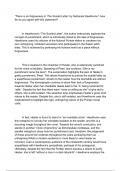“There is no forgiveness in ‘The Scarlet Letter’ by Nathaniel Hawthorne”- how
far do you agree with this statement?
In Hawthorne’s “The Scarlet Letter”, the author extensively explores the
concept of punishment, which is intrinsically linked to the idea of forgiveness.
Hawthorne uses his criticism of the fictional Puritan elders to condemn his
own unforgiving, intolerant ancestors who participated in the Salem witch
trials. This is achieved by portraying his fictional world as a place without
forgiveness.
This is clearest in the character of Hester, who is extensively punished
for her crime of adultery. Speaking of Pearl, she exclaims “She is my
punishment none the less!”. The exclamation highlights the pain of Hester’s
godly punishment, Pearl. This allows Hawthorne to portray the scarlet letter as
a superfluous punishment, showin to the reader how the townsfolk are without
forgiveness. The townspeople continue to show their lack of forgiveness
towards Hester when her charitable deeds lead to the “A” being renamed for
“able”. Despite the fact that there were “none so willing as she” to give aid to
others, she is still isolated. The assertive tone emphasises Hester’s good, kind
nature to the reader. Despite this, she is still isolated, and Hawthorne uses this
mistreatment to highlight the rigid, unforgiving nature of the Puritan moral
code.
In fact, Hester is found to stand in “an inviolable circle”. Hawthorne uses
this metaphor to convey her complete isolation to the reader, and this is a
recurring image throughout the novel. Towards the novel's conclusion, she
stands in another “circle of ignominy” as Dimmesdale confesses, and the
parallel metaphors show how her punishment (and, therefore, the judgement
of those around her) extends throughout the years portraying them as
unforgiving Whilst a modern audience is more likely to view Hester as
innocent, even a contemporary audience of the nineteenth century would have
empathised with Hawthone’s sympathetic portrayal of his protagonist.
Ultimately, despite the fact that the Puritan elders express a desire to purify
Hester, she is left “without a clue in a dark labyrinth”. Hawthorne employs the




